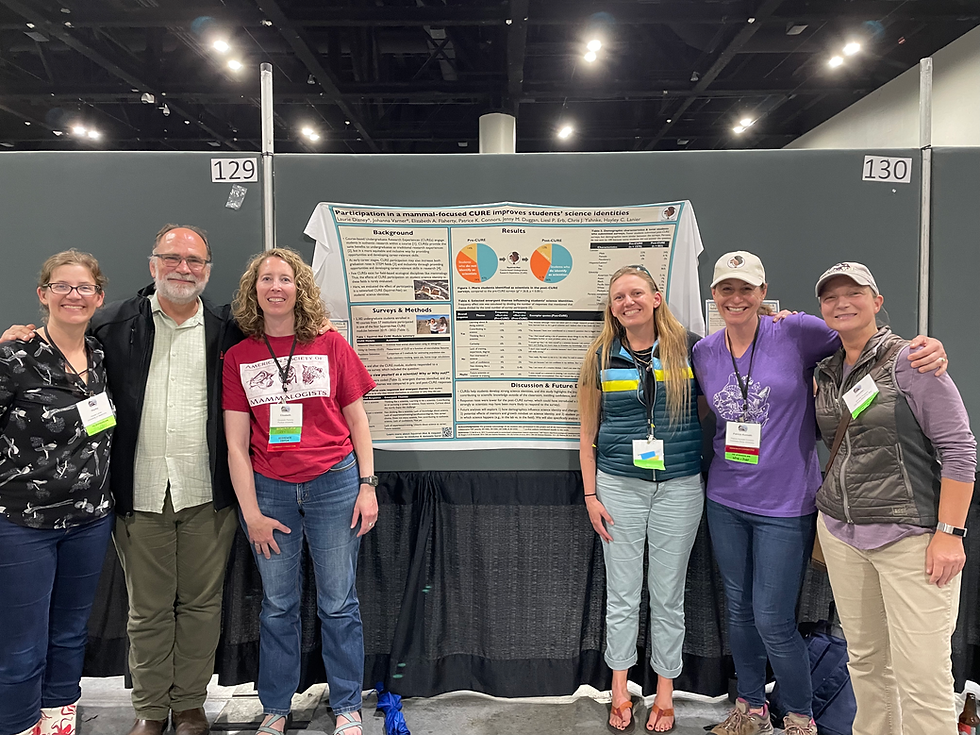Creating Community through Networked CUREs
- Patrice K. Connors

- Dec 29, 2021
- 4 min read
As we approach the new year, we've been reflecting on 2021, which was a busy year for Squirrel-Net. Members of our community presented at five different conferences for regional and national societies, and we published articles in two peer-reviewed journals. One of those publications was the result of our participation in an education-focused symposium at the 2021 conference for the Society for Integrative & Comparative Biology.

The symposium “Biology Beyond the Classroom: Experiential learning through authentic research, design, and community engagement” was co-organized by Alexandria Hansen from California State University, Fresno, Lisa Whitenack from Allegheny College, Robert Full from University of California, Berkeley, and Squirrel-Net’s own Hayley Lanier and Patrice Connors (from University of Oklahoma and Colorado Mesa University, respectively). An amazing group of passionate educators gathered for the virtual symposium and shared ideas, tricks and tips, and success stories of experiential learning across a diverse range of classrooms and students. Most participants from the symposium also published articles with the journal Integrative & Comparative Biology (ICB). The full list of articles from the symposium can be found here. In fact, the cover of this issue of ICB features the photo below from one of the symposium speakers, Dermot Donnelly-Hermosillo from California State University, Fresno!

The Squirrel-Net team focused our symposium presentation and subsequent publication on the benefits of networked CUREs (course-based undergraduate experiences). CUREs are becoming widely popular as a way to provide authentic research experiences to students in an equitable manner. As a result, students gain a suite of skills including critical thinking and practicing the iterative process of science, as well as more positive views towards science in general and of themselves as scientists (see this foundational paper about CUREs for more info). The first CUREs were created and employed in single classrooms or individual courses to great success. However, because science today is increasingly social and collaborative, networked CUREs like Squirrel-Net provide important career-relevant experiences for today’s students. Such CUREs are intentionally developed to be multi-institutional, bringing hundreds or thousands of students together over a shared research goal, thereby providing students a real-life collaboration experience.
Broadly, networked CUREs also reduce barriers for implementation by providing a completed curriculum and technical support for students and instructors. In addition to Squirrel-Net, other great examples of networked CUREs in biology include Tiny Earth and BCEENET. One benefit to students participating in a networked CURE is access to a large

database of student-generated data, which empowers students to test a wide variety of novel hypotheses of their own choosing. Since data are collected by students, networked CUREs promote project ownership among students while simultaneously connecting them to a large community of other students either working with the same tools or on the same questions. Instructors benefit from participating in networked CUREs by gaining free access to a fully developed and tested lesson plan for a new research activity to implement in their course. Moreover, instructors are connected with other instructors who have used the activity in their classrooms, as well as the original authors of the activity, for trouble-shooting and overcoming obstacles.
While there are many apparent benefits to using networked CUREs, there is a substantial knowledge gap in their empirical assessment. Our publication in ICB notes that few if any peer-reviewed studies have investigated the impact of networked CUREs on student gains of scientific knowledge or any change in a student’s sense of belonging to a scientific community. However, what is well documented are the benefits of collaboration and community-building in the professional sciences as well as science-studying students. Collaborations directly result in higher impact publications for professional scientists, and undergraduate students that participate in collaborative learning earn higher scores in their science classes and are more likely to persist in STEM fields. To address this knowledge gap, Squirrel-Net is actively assessing student and instructor experiences with our networked modules, and we predict that networked CUREs will provide benefits to students and instructors alike.
Squirrel-Net was created to fill these knowledge gaps, while also providing a unique field-based and mammal-centric research experience. By joining the Squirrel-Net community, you not only gain the many benefits of participating in a networked CURE, but you have the opportunity to help the Squirrel-Net steering committee assess how well the modules meet these goals. We have developed short pre-assessment and post-assessment surveys for students, who are incentivized to complete the surveys with a prize drawing. We also created a short post-assessment survey for instructors. Access to these surveys are given to instructors who join the network, (which is super easy to do!). We are happy to answer any other questions you might have about the assessment (contact us here), since we believe that together, we can determine the true impact of a community-based research experience.
And finally, Squirrel-Net is heading back to the annual conference for the Society for Integrative and Comparative Biology! SICB 2022 is happening both in-person in Phoenix,

AZ from January 3-7 as well as virtually from January 14 - March 31. You can still register to join the asynchronous conference this spring at SICB’s 2022 meeting website. Patrice Connors
will be presenting in-person on behalf of our Squirrel-Net community member Beth Davis-Berg, reviewing some ways that our modules can be modified for specific classes and for online teaching. If you attend SICB 2022 in Phoenix, please find Patrice to say hello and chat anything squirrels (or woodrats or March Mammal Madness)! And if you join SICB 2022 virtually, watch Beth’s recording of the talk!
Citation: Connors PK, Lanier HC, Erb LP, Varner J, Dizney L, Flaherty EA, Duggan JM, Yahnke CJ, Hanson JD. (2021). Connected while distant: Networking CUREs across classrooms to create community and empower students. Integrative and Comparative Biology. 61(3): 934-943. (https://doi.org/10.1093/icb/icab146)
Please contact us at Squirrel-Net if you have trouble accessing our publication or need a reprint of the PDF!



Comments